The 15 Best TV Episodes of 2022 (So Far)
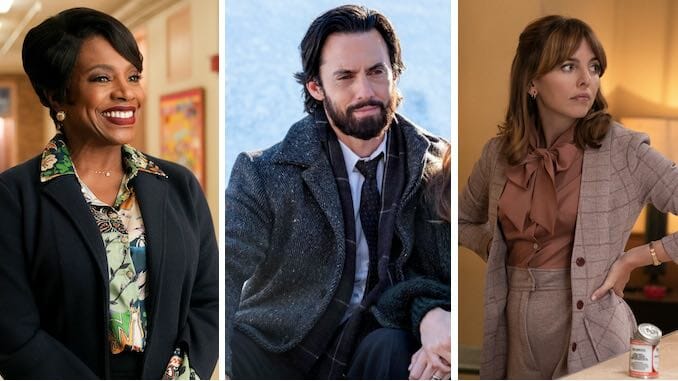
In an era of binge, the art of the TV episode can get lost in “play next” haste. As more and more series focus on over-arching narratives rather than episodic plots, it’s harder than ever to notice a specific hour or half-hour of TV that really made you feel a certain kind of way. But the 15 episodes featured below managed to do just that. Many overlap with our Best TV Shows of 2022 (So Far) list, but in a way, that makes them even more impressive: even among an entire series that is worth celebrating, these particular episodes stood out.
We did limit each series to only get one entry on this list, even when multiples were mathematically in contention. That gave space to some series and episodes that we haven’t highlighted elsewhere—because folks, Peak TV is back, and there is a lot to watch and talk about. Below are just some of our favorites; come back in December for even more.
Eligibility: Episodes had to air between January 1 and May 31, 2022. That means some episodes are from shows that weren’t eligible for our Best Shows list, but still individually count. The selections below were nominated by and voted on by the Paste staff and TV writers.
Spoiler note: While we do try and keep some big twists vague in the blurbs below, other major spoilers can’t be avoided. If you haven’t caught up with a series and aren’t sure you want to know more, just scroll on past!
![]()
“Yasper,” The Afterparty
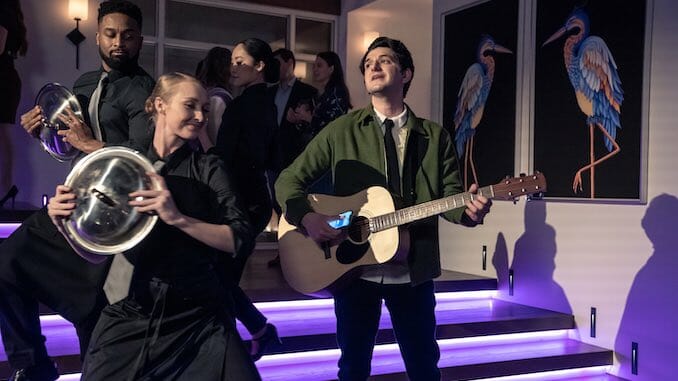
Written by: Jack Dolgen
Directed by: Chris Miller
Network: Apple TV+
The joy of The Afterparty is that every episode is different. The murder mystery from Chris Miller and Phil Lord cycles through different genres with each outing, as Detective Danner (Tiffany Haddish) interviews the suspects in the untimely death of a high-profile celebrity (Dave Franco) at his high school reunion afterparty. But not every episode of the eight-episode first season is created equal. “Yasper,” which is told from the point of view of its eponymous larger-than-life character (played by Ben Schwartz), easily stands out as the show’s best. Not only that, it is also one of the best episodes of the year so far.
A toe-tapping good time thanks to Yasper’s infectious energy and three show-stopping original songs crafted by Jon Lajoie with input from writer Jack Dolgen (an Emmy winner for Crazy Ex-Girlfriend), the episode is an example of everything coming together perfectly, from the writing and casting to directing and acting. The comedic and high-energy elements, like the Eminem-inspired rap “Two Shots” and the pop number “Yeah Sure Whatever,” are softened by Yasper’s vulnerability and the relatability of “Three Dots from Stardom,” a ballad dedicated to Apple’s best and worst invention: The three dots that let you know someone is typing… and then not. At the same time, Aniq (Sam Richardson) is trying to clear his name and solve Xavier’s murder by asking everyone at the party to spell diarrhea in the hopes of matching a handwriting sample. I’m really not sure what more one could ask for in an episode of TV. So yes, “Yasper’’ is one of the best episodes we’ve seen all year, and it’s unlikely that we’ll see anything that comes even close to matching it in creativity and originality by year’s end. —Kaitlin Thomas
“Open House,” Abbott Elementary
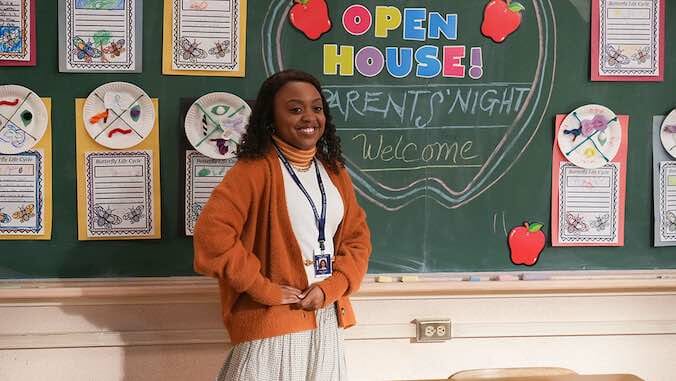
Written by: Brian Rubenstein
Directed by: Jen Celotta
Network: ABC
How do you choose the best episode this stellar comedy offered up in its first season? Was it the season finale which featured Ava’s best and most self-aware line yet (“Girl I know! I just say whatever I want”)? Was it “Desking,” where the students partake in the latest social media challenge and we finally meet Jacob’s boyfriend Zack (“So he knew you and was like… ‘more.’”)? Or was in when Janine and Ava collaborated on teaching the kids in “Step Class” (“We like to play this game called ‘call and no response,’ the kids are so good at it.”) and we learn Gregory doesn’t like pizza? The truth is, the show’s inaugural season didn’t miss for 13 episodes. Every outing was a gem. But we settled on the episode that epitomizes what makes the comedy so special: its unique mix of humor and heart without being sardonic or saccharine.
While the teachers prepare for an Open House and a visit from the superintendent (Reginald Hayes), Jacob (Chris Perfetti) slyly outsmarts Melissa (Lisa Ann Walter) in a game of poker. We finally understand how the not-exactly-competent Ava (Janelle James) got the job as Principal (she saw the Superintendent cheating on his wife) which sends Gregory (Tyler James Williams) into a tailspin (he’s so upset he’s even loosened his tie). But the episode belongs to Janine (star and executive producer Quinta Brunson) and Barbara (Sheryl Lee Ralph), as we learn why Janine so blatantly craves Barbara’s approval. It’s not just the professional development and expertise Barbara provides, it’s the emotional void she fills for Janine, whose mother ignores her. Barbara also struggles with her own daughter Taylor (Iyana Halley), who visits from New York and works for a “high end alcohol company.” “With your gifts you could be helping people,” Barbara says.
While she may not be “Saint Barbara” as Janine has dubbed her, we see what a truly wonderful person Barbara is as she tells her daughter that even though she may not approve of Taylor’s life choices, “I love you and I’m proud of you and I will always be there for you.” Sensing that Janine needs that same type of unconditional love, the episode ends with Barbara inviting Janine out to dinner. “Am I dreaming?” Janine wonders. She’s not, but the episode is the stuff TV dreams are made of. —Amy Amatangelo
”Brothers and Sisters,” The Flight Attendant
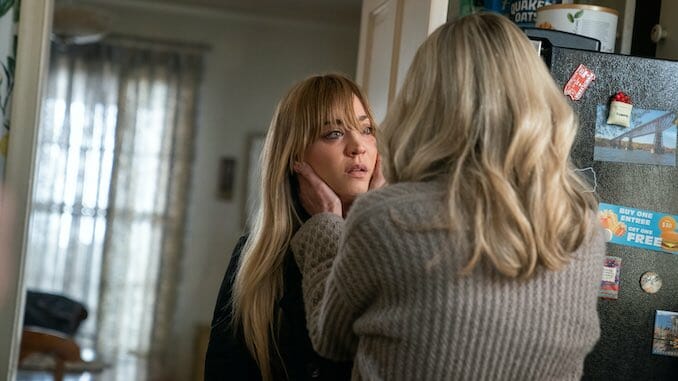
Written by: Ian Weinreich, Kristin Layne Tucker
Directed by: Silver Tree
Network: HBO Max
The Flight Attendant, Kaley Cuoco’s weird and wonderful dark comedy thriller, has always been sensational. From the nail-biting tension of its masterfully done spy-thriller storylines to the realistic and respectful portrayal of alcoholism, The Flight Attendant has had more stellar episodes than I can count. However, none stand out more than Season 2’s sixth episode “Brothers and Sisters,” which follows Cassie Bowden (Cuoco) and her brother Davey (T.R. Knight) as they return to New Jersey to visit their father’s grave and clean some things out of their mother’s home. Though, with one caveat: Cassie has just broken her sobriety, and to make matters worse, it becomes clear that Davey has set-up this trip as an attempt to reconnect Cassie to their mother.
The confrontation between Cassie and her mother is a heartbreaking conversation between two people who have both failed each other in every way, portrayed beautifully by both Cuoco and guest star Sharon Stone as Lisa Bowden. In what is probably the most soul-crushing piece of dialogue ever written, Lisa tells her daughter: “I love you, I do, but I don’t like you. At all,” followed immediately by a slap to Cassie’s face. There are other wonderful story elements that happen in this episode, including Megan (Rosie Perez) reuniting with her family, but it all becomes white noise as those chilling words haunt the rest of the episode. At its core, The Flight Attendant is about a woman trying to recover from every terrible hand life has ever dealt her, and this episode, for a moment, lets go of the thrills and chills to tell a very human story about that woman and her broken family, to incredible success. —Anna Govert
“The Swordsmanship of a King,” Ranking of Kings
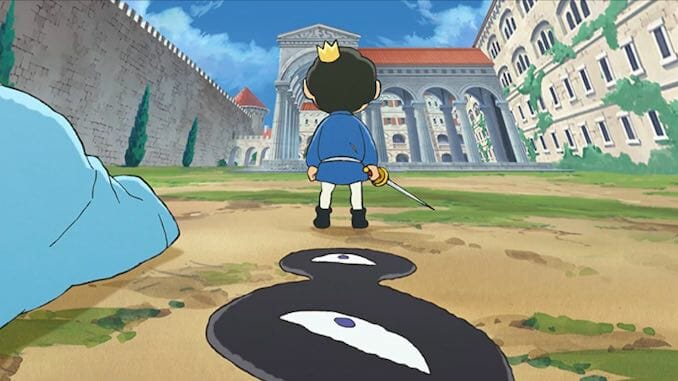
Written by: Taku Kishimoto
Directed by: Shota Goshozono
Network: Crunchyroll
The first (but hopefully not last) season of Ranking of Kings aired from October 2021 through March 2022; on the strength of its first half alone, it made second place in our Best New Anime of 2021 list. While the season’s second half had more questionable narrative decisions than its near-perfect beginning, it still delivered some of the biggest thrills and most heartwarming moments of any TV show this year. In “The Swordsmanship of a King,” the show’s climactic third-to-last episode, the thrilling and heartwarming scenes are one and the same. Bojji’s duel against his resurrected father Bosse is a stunning feat of animation, and it’s impossible not to feel proud for the disabled hero proving himself to have become the strongest in the kingdom. —Reuben Baron
“710N,” Barry
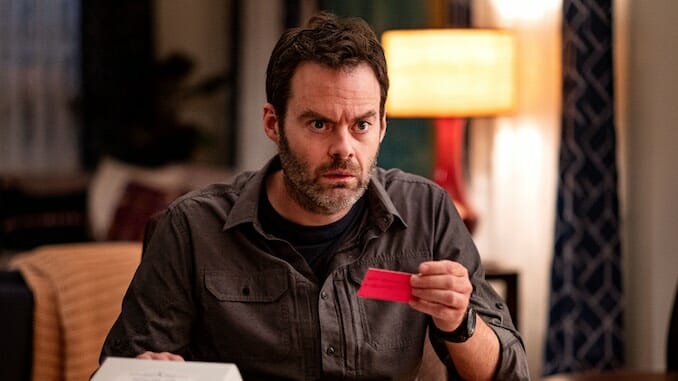
Written by: Duffy Boudreau
Directed by: Bill Hader
Network: HBO
Barry, for all intents and purposes, should not be a comedy. It’s a show about a hit-man with post-war PTSD who is, at this juncture in the series, basically holding his mentor hostage and threatening the lives of the man’s son and grandson. However, it’s one of the few shows that actually succeeds in coming at the word “dramedy” from the comedy side of things.
Named for one of the freeways in Los Angeles (although, c’mon folks, you know it should be the 710N), the episode is memorable for two things. One is an epic freeway chase scene featuring the city’s infamous stop-go traffic and the state’s policy of sharing the road with motorcyclists who weave in and out of said traffic at lightning speed. The titular Barry’s (star/co-creator Bill Hader) survival skills are superhuman as he dodges bullets from a revenge-seeking motorcycle gang. The stunts become more absurd (a shoot-out at a car dealership?) as the body count rises. But Barry survives physically unscathed.
The other is for the sage wisdom offered by a new character: Baker Mitch (Tom Allen) of the fictitious, but totally believable, Los Angeles restaurant Beignets by Mitch. Speaking in the perfect SoCal surfer dude/stoner cadence, Mitch is both a therapist to several of the series’ protagonists and their dealer for overpriced gluten.
But there’s also another important scene in this episode. Vanessa Bayer guest-stars as a development executive looking to hire actress and writer Sally (Sarah Goldberg) to help bring more “yeah” to a show that helped tank Sally’s own program. In a conversation spoken almost totally in inflection-tinged interjections, Bayer’s Morgan Dawn-Cherry and Sally’s agent Lindsay (Jessy Hodges) discuss what she can and cannot bring to a series while the talent looks on in horror and confusion upon hearing this foreign language for the first time.
The whole episode is a dunk on Los Angeles stereotypes more than any of Saturday Night Live’s “The Californians” sketches ever could. —Whitney Friedlander
“The We We Are,” Severance
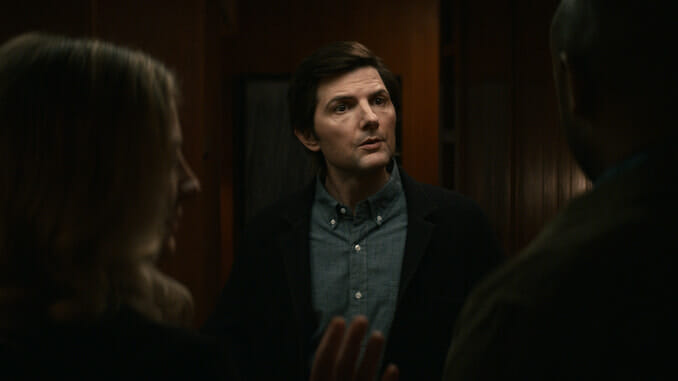
Written by: Dan Erickson
Directed by: Ben Stiller
Network: Apple TV+
Severance took its time ushering us into the eerie world of Lumon Industries, a corporation where some employees undergo a surgery that divides their memories between work and their personal lives. Through the eyes of Mark S. (Adam Scott), the show delves into the compartmentalization that capitalism demands with offbeat humor and unsettling production design. Inevitably though, these separate selves bleed together, and the previous eight episodes’ slow build pays off in a nail-biting finale that thrillingly feels like a finale instead of just another episode. Playing out nearly in real time, “The We We Are” cuts between Dylan G.’s (Zach Cherry) waffle party-deserving heroism and the rest of the MDR department’s innies getting unleashed in the outside world for the first time. Down to Mark’s final desperate yell, the episode offers just the right amount of answers and catharsis to make the show’s lingering questions all the more tantalizing while we wait for Season 2. Because seriously—what’s going on with those goats? —Annie Lyons
“Oh, so you’re the sun now? You’re the giver of life?” Minx
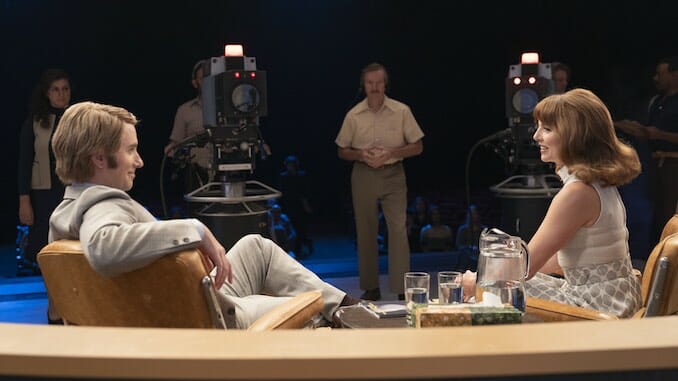
Written by: Ben Karlin
Directed by: Rachel Lee Goldenberg
Network: HBO Max
Minx is a show about the compromises necessary to fulfill your dreams. It stars Ophelia Lovibond as feminist writer-editor Joyce Prigger, seizing her moment by finding the most fun and practical way to engage her audience with Jake Johnson’s pornographer publisher Doug Renetti, an unlikely partnership that grows over the course of the series, and reaches a stumbling block in Episode 8.
“Oh, so you’re the sun now? You’re the giver of life?” perfectly encapsulates the show’s themes of fighting to have one’s voice heard and vision respected as a woman, while people (especially men in positions of power) take advantage of talents without returning respect. Joyce and Doug’s Minx magazine—feminist writing on lifestyle and political topics, nude male centerfolds, and risqué puzzles and games—courts controversy and acclaim while selling out magazine stands.
On the heels of their newfound success, Joyce is invited to New York to be interviewed by Dick Cavett (Erin Gann), returning to her university stomping grounds, revisited by memories of her time dealing with sexism at an anti-war commune and in the magazine offices she started out in. Meanwhile, Doug’s business mind and fast talk drive a wedge in the professional relationship they’d recently balanced. That projects a ripple into the shared social lives of their community while photographer Richie (Oscar Montoya) and centerfold director Bambi (Jessica Lowe) watch the interview with Tina (Idara Victor) and interrogate her about her love life. “Oh, so you’re the sun now? You’re the giver of life?” helps this first season of Minx swing into its final arc and set a new status-quo for the second season. It had everything we loved about the show: A fierce and fun exploration of gender dynamics and social norms with a narrative that always kept us on our toes. —Kevin Fox, Jr.
“The Train,” This Is Us
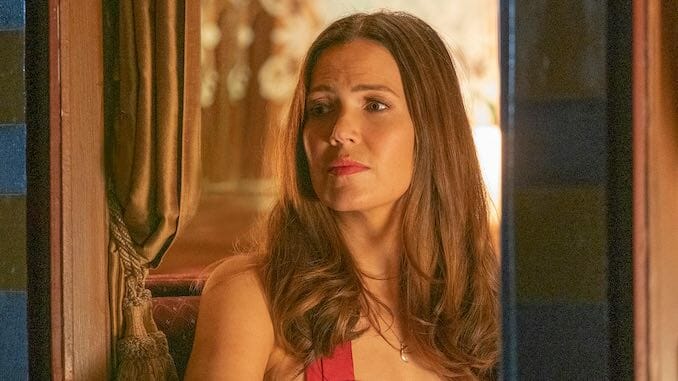
Written by: Dan Fogelman, Jon Dorsey, Danielle Bauman
Directed by: Ken Olin
Network: NBC
After five dramatic seasons, NBC’s This Is Us came to a close in one of the best final runs of a show ever. The time-jumping family drama that follows the lives of three siblings in the past, present and future said goodbye to their matriarch Rebecca Pearson (an impeccable Mandy Moore) in the penultimate episode of the series, “The Train.” As Rebecca’s Alzheimers worsens, the family gathers to say their goodbyes to her comatose body. But inside Rebecca’s head she’s on a metaphorical train, presumably to heaven, modeled after the one she used to ride with her dad, and guided by none other than Randall’s birth father William—a nice callback to their spiritual bond.
The resulting episode is both melancholic and joyous: Kate almost doesn’t make it back from London before her mother passes, but Deja tells Randall that he’s going to be a grandfather. Rebecca is reunited with Jack while Miguel stands in the wings. Moore has been fantastic throughout the five-season run but is especially great here as Rebecca relives her life’s biggest moments and contemplates the mistakes she may have made along the way.
Written by show creator Dan Fogelman, “The Train” is chock-full of little soundbites about how hard and beautiful life can be, and full of reminders that life will always move on. It’s about as This Is Us as it can get (in a good way!) The episode is an instrumental piece of the gorgeous send-off to a show that showcased the small wins in life right next to the big dreams, and is a tribute to the family and friends that help all of us get to our finish lines. —Radhika Menon
“Act of Grace,” Our Flag Means Death
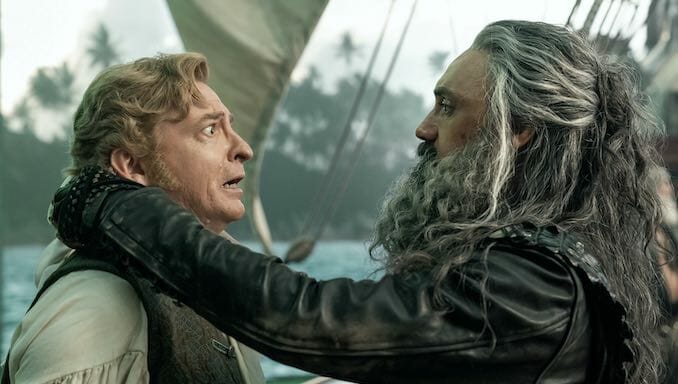
Written by: David Jenkins, Yvonne Zima and Eliza Jiménez Cossio (executive story editor)
Directed by: Bert and Bertie
Network: HBO Max
While the absolute best *moment* of the first season of Our Flag Means Death technically happens in the last two minutes of the episode that precedes it, the season’s penultimate outing, “Act of Grace,” spins out from that scene with such exquisite (and funny!) tenderness that it’s hard to argue that it’s the best episode put out by David Jenkins’ gay little pirate rom-com to date. I mean, these 27 minutes have everything: A hero turn! An unspoken conversation between two men in love! A gag about contract law! A very explicitly spoken conversation between two men in love! Soap!! That writers Jenkins and Yvonne Zima were able to cram in not just a half-dozen meaningful callbacks to what viewers thought were just throwaway gags from the beginning of the season, but also an explicit, full-mouth-kiss confirmation of Stede’s and Blackbeard’s gay love story and a shocking heartbreaker of a wrench thrown headlong into those proverbial works? That’s just a testament to the intricate genius of the entire series. — Alexis Gunderson
“Plan and Execution,” Better Call Saul
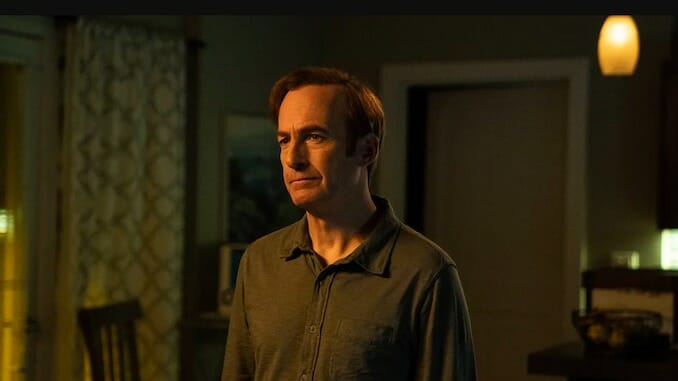
Written by: Thomas Schnauz
Directed by: Thomas Schnauz
Network: AMC
Serving as the series mid-finale before an agonizing six-week break, the title of “Plan and Execution” contains a dark pun. Throughout the season, we see Jimmy McGill (Bob Odenkirk) and Kim Wexler (Rhea Seehorn) doing a series of bizarre acts in order to somehow frame the toothy, almost robotic Howard Hamlin (Patrick Fabian) as a drug addict in order to get the Sandpiper settlement to close early and give both a big, albeit smaller, payout. The first half of the episode is satisfying, butt-clenching action that finally explains how all the weird things Jimmy and Kim have been doing are leading to taking down Howard.
Unlike Breaking Bad, which its timeline precedes, Better Call Saul typically carries a lighter tone, with much of the series containing Jimmy’s hilarious schemes and jokes that get him into and out of trouble. However, this only makes the serious moments hit harder, as the scarily charismatic foil to Giancarlo Esposito’s Gus Fring, Lalo Salamanca (Tony Dalton), enters completely unexpectedly during Howard’s deranged monologue. Lalo politely stands to the side while screwing on a silencer to his gun, then quickly and effortlessly shoots Howard in the head as nonchalantly as one might hang a coat. Similar to Hank’s (Dean Norris) death in Breaking Bad’s final season, this death of an ultimately innocent and well-meaning person marks the beginning of the end for both Jimmy and Kim, showing that their funny little jokes and schemes have killed another person. —Joseph Stanichar
“Retired,” Hacks
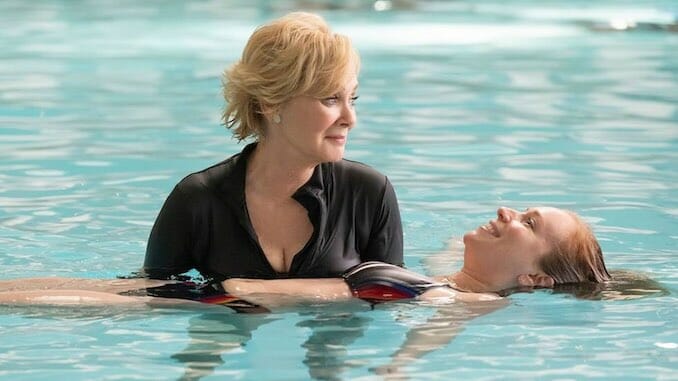
Written by: Andrew Law
Directed by: Paul W. Downs
Network: HBO Max
Hacks is fueled by the all-powerful engine that is Jean Smart’s Deborah Vance. The dimensions to her character, her ability to be witty and cruel and even—very rarely—kind has made her one of the best characters on TV right now. “Retired” works so well because we get to see every part of her on display. Playing against the always wonderful Harriet Sansom Harris’s Susan, everything petty about Deborah rises to the surface, only to come crashing down after being upstaged by a cow giving birth to twins. “Retired” examines the sacrifices that Deborah, Ava, Marcus, and Susan have made. Ava and Marcus’s surprisingly existential caricature session is that perfect mix of funny and depressing while also proving that Hannah Einbinder and Carl Clemons-Hopkins are the most underrated duo of the show. Authenticity may have been something Deborah gave up, but seeing former rival Susan find a fulfilling life in the middle of nowhere is one of the great shocks to her character that makes Deborah even more interesting. And to top it all off, the episode ends with one of the best scenes of the show, where Deborah teaches Ava to float as the two riff off each other. Everyone in Hacks has made sacrifices, but “Retired” argues that not all sacrifices are losses. —Leila Jordan
“White Fashion,” Atlanta
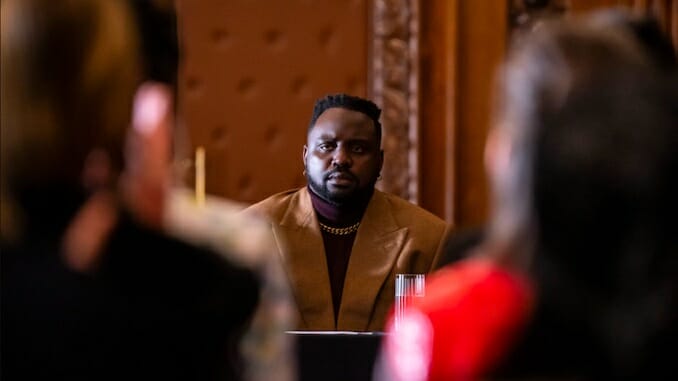
Written by: Ibra Ake
Directed by: Ibra Ake
Network: FX
This was an interesting season of Atlanta, one that went back and forth between furthering the story of its leads, who were on a European tour, and telling one-off Georgia-based fables about race. For the most part, the latter stories were better than the former, although “White Fashion”—which focused on Paper Boi (Bryan Tyree Henry) being offered a lucrative deal with a European fashion house—was a standout. The disarming episode not only melded together some of the show’s best elements, but it encapsulated some of its most potent themes this season.
In it, Paper Boi is asked to help mitigate a race-related PR disaster, and in exchange, is given essentially anything he wants (clothes, money, etc). At first he and Alfred (Lakeith Stanfield) take eager advantage of this, until Earn (Donald Glover) challenges his cousin to consider what he could really do with this power. Paper Boi, galvanized to really try and help his community back home, takes a seat on a committee of Black influencers only to find that everyone is just out to help themselves. Further, the promises made by the fashion house are politely hollow.
As this plays out, Alfred also introduces a white assistant to Nigerian food—which leads to her buying the place out and starting her own food truck right outside where the authentic food used to be made. “White Fashion” is not subtle, but it is effective. Like the best episodes of the the show’s third seasons, it ends with more of a question than an answer, one that should cause all viewers to reflect not only on the episode’s truth, but what our part is in it. —Allison Keene
“Sic Transit Gloria Mundi,” Yellowjackets
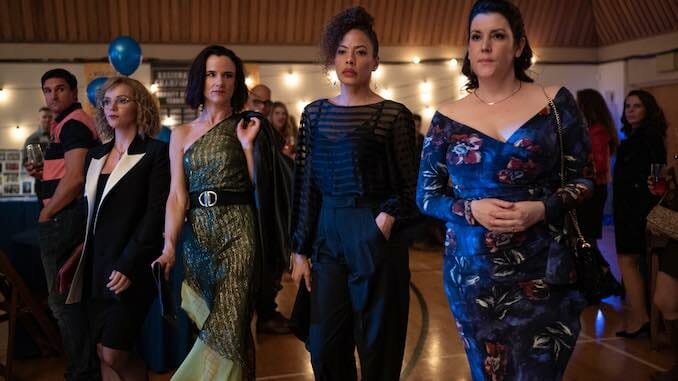
Written by: Ashley Lyle & Bart Nickerson
Directed by: Eduardo Sánchez
Network: Showtime
Yellowjackets gave us the wildest ride that TV had to offer throughout the course of its first season, and the crown jewel of that journey came in the form of the season finale. “Sic Transit Gloria Mundi” grabbed the wildly waving plot threads and tied them into what turned out to be a very neat bow.
In the present day, Misty (Christina Ricci) leads the rest of the group in the exercise of crime scene cleanup and body disposal. The crew then rolls up to their 25-year high school reunion where they’re met with Allie (Tonya Cornelisse), who somehow managed to worm her way into being in charge of the event despite not being a part of the class it’s celebrating. Presumably because all she knows how to do is exploit trauma she wasn’t actually a part of, Allie has made the reunion a team showcase that concluded in Shauna (Melanie Lynskey) and Jeff (Warren Kole) dancing together as a photo of Jackie stares down on them. Afterwards, Taissa (Jasmine Savoy Brown)—much to her surprise—wins her bid to become the first black female senator of New Jersey. Unfortunately, her wife finds their dog’s head and heart as a part of the creepiest shrine of all time, and the oddly menacing smile Brown leaves the season with is just… disconcerting. The biggest of the game changers comes in the form of the reveal that Lottie is still alive—and that she probably has an entire cult of people working for her who just kidnapped Natalie (Juliette Lewis).
Back in the ‘90s, we’re met with horrible emotional devastation of Jackie’s (Ella Purnell) death. For something you know is coming the entire season, the way this played out was brutal. At its core, Jackie’s fight with Shauna (Sophie Nélisse) was very high school (because, you know, they’re high schoolers), and the way they dealt with it was in the same vein. Banishing your friend from the room because you’re mad at her during a sleepover is par for the course-if this was an actual sleepover and not an abandoned cabin in the woods. Jackie freezing to death is a cruel way to go, and watching everyone find her in the morning was an incredibly tragic way to close things out. —Kathryn Porter
“Old White Men,” The Dropout
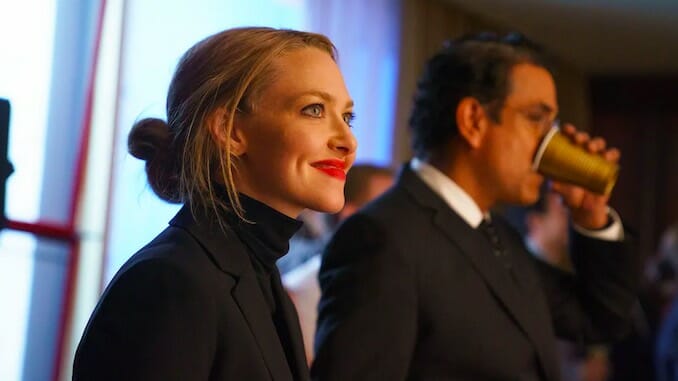
Written by: Dan Lefranc
Directed by: Michael Showalter
Network: Hulu
“Do you ever feel like a plastic bag drifting through the wind, wanting to start again?” How exactly did Elizabeth Holmes (Amanda Seyfried) convince Walgreens to invest in Theranos when the technology she claimed existed most decidedly did not? She hoodwinked them, preying on their insecurities as “aging dinosaurs” in this new start-up world of Jack Dorseys and Mark Zuckerbergs. To the dismay of lab expert Kevin Hunter (Rich Sommer), she and her partner Sunny Balwani (Naveen Andrews) wouldn’t even let them into the Theranos lab. She made them sign countless NDAs and bluffed that she was going to do a deal with CVS instead. It’s an intense hour with stellar performances from Seyfried and Stephen Fry, who will break your heart as Theranos head chemist Ian Gibbons. But the episode belongs to Alan Ruck as Walgreen’s medical director Dr. Jay Rosen (you can call him Dr. Jay) who is so awkward trying to fit in with the cool crowd, and Josh Pais as Walgreen’s brash CFO Wade Miquelon, who almost walks away from the deal until he makes the ultimately catastrophic decision to go into business with Theranos and open up Walgreens “wellness centers.” As Ruck, Pais, and Andrew Leeds serenade Elizabeth in a cringe-inducing version of “What I Like About You,” it’s like watching a car wreck in slow motion. We know what’s coming next, but we can’t look away. —Amy Amatangelo
“Trevor’s Pants,” Ghosts
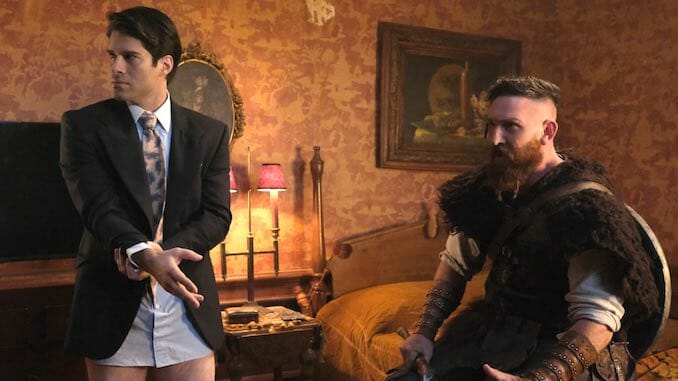
Written by: Kira Kalush & Talia Bernstein
Directed by: Trent O’Donnell
Network: CBS
The delightful Ghosts answered a major question in a fantastic late-season episode: where are Trevor’s pants? The Wall Street ghost bro had evidently died with his hair coiffed and his work attire intact… other than his pants. So what happened? Though Trevor (Asher Grodman) has provided some of the show’s best one-liners and reactions, “Trevor’s Pants”—while also being a hilarious send-up of late ‘90s / early 2000s bro culture—was a surprisingly tender and nuanced explanation to a long-running sight gag. It worked, in spades, and was ultimately a major departure from the story of Trevor’s UK series counterpart, Julian, whose death was far more nefarious. One of the best things to discover about Trevor throughout this first season is that he really is a d-bag with a heart of gold. (And perhaps he’s not even a d-bag at all.) Further, the episode solidified some of the ghost friendships in the house, and brought everyone together to celebrate while a villain chugged a Chekhov Chill. Dude… it was totally awesome. —Allison Keene
For all the latest TV news, reviews, lists and features, follow @Paste_TV.







































